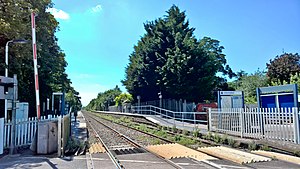| Burton Joyce | |||||
|---|---|---|---|---|---|
 | |||||
| General information | |||||
| Location | Burton Joyce, Gedling England | ||||
| Grid reference | SK644433 | ||||
| Managed by | East Midlands Railway | ||||
| Platforms | 2 | ||||
| Other information | |||||
| Station code | BUJ | ||||
| Classification | DfT category F2 | ||||
| Passengers | |||||
| 2019/20 | |||||
| 2020/21 | |||||
| 2021/22 | |||||
| 2022/23 | |||||
| 2023/24 | |||||
| |||||
Burton Joyce railway station serves the large village of Burton Joyce in Nottinghamshire, England. It lies between Carlton and Lowdham stations on the Nottingham to Lincoln Line.
History

The builders of the railway faced a good deal of opposition at Burton Joyce, which resulted in the station being outside of the village. The preferred site of the railway company was near to the Lord Nelson inn, but the innkeeper objected on the grounds that he would have to brew more beer. The vicar of St Helen's Church, Revd. John Rolleston, near whose vicarage the line was to run, objected to the railway on account of the noise. Finally, the promoters of the railway bought him out and built a new vicarage for him.
The line was engineered by George Stephenson and was opened by the Midland Railway on 3 August 1846. The contractors for the line were Craven and Son of Newark and Nottingham.
The westbound platform was shortened significantly when locomotive-hauled trains were replaced in the 1960s.
Stationmasters
- Joseph Peel ca. 1859 - 1877
- Charles Jobbins 1877 - 1879 (afterwards station master at Coaley Junction)
- William Allen 1879 - 1884
- W. Whatley 1884 - 1886
- William Henry Payne 1886 - 1892 (formerly station master at Tonge and Breedon)
- F. Porter 1892 - 1895 (afterwards station master at East Langton)
- Frederick Mason 1895 - 1899 (afterwards station master at Mansfield Woodhouse)
- Sidney W. Varnam 1899 - 1903 (afterwards station master at Old Dalby)
- E.H. Allen 1903 - 1906
- H.D.D. Hinton 1906 - 1908
- George Calow 1908 - ca. 1911 (formerly station master at Watnall)
- G. Dewey ca. 1914
- A.R. Powell from 1938
Facilities
The station is managed by East Midlands Railway.
It has two platforms, a five-space car park, a help point and shelters on both platforms.
Services
East Midlands Railway operates all trains that stop at the station.
Burton Joyce is served by a route between Newark Castle and Crewe, via Nottingham. Trains call every two hours each way throughout the day, with additional services at peak times and evenings between Lincoln to Nottingham and Leicester.
On Sundays, trains stop every two hours each way; these run between Lincoln and Nottingham only.
| Preceding station | Following station | |||
|---|---|---|---|---|
| Carlton | East Midlands RailwayNottingham–Lincoln line | Lowdham |
External links
- Train times and station information for Burton Joyce railway station from National Rail
References
- "Old Burton Joyce was Trade Hub". Nottingham Journal. England. 5 July 1948. Retrieved 4 February 2021 – via British Newspaper Archive.
- ^ "Opening of the Nottingham and Lincoln Railway". Lincolnshire Chronicle. England. 7 August 1846. Retrieved 2 March 2016 – via British Newspaper Archive.
- ^ "1871-1879 Coaching". Midland Railway Operating, Traffic and Coaching Depts: 392. 1871. Retrieved 11 December 2021.
- "Midland Railway Staff Changes". Sheffield Daily Telegraph. England. 7 September 1899. Retrieved 29 January 2021 – via British Newspaper Archive.
- "Midland Railway Changes". Belper News. England. 3 January 1908. Retrieved 29 January 2021 – via British Newspaper Archive.
- "Mr. A.R. Powell". Belper News. England. 15 July 1938. Retrieved 29 January 2021 – via British Newspaper Archive.
- "Burton Joyce". National Rail. 2024. Retrieved 12 February 2024.
- "Timetables". East Midlands Railway. 10 December 2023. Retrieved 12 February 2024.
| Railway stations in Nottinghamshire | |
|---|---|
| East Coast Main Line | |
| Midland Main Line | |
| Nottingham–Grantham line | |
| Nottingham–Lincoln line | |
| Robin Hood Line |
|
| Sheffield–Lincoln line | |
52°58′59″N 1°02′30″W / 52.98306°N 1.04167°W / 52.98306; -1.04167
This article on a railway station in the East Midlands is a stub. You can help Misplaced Pages by expanding it. |